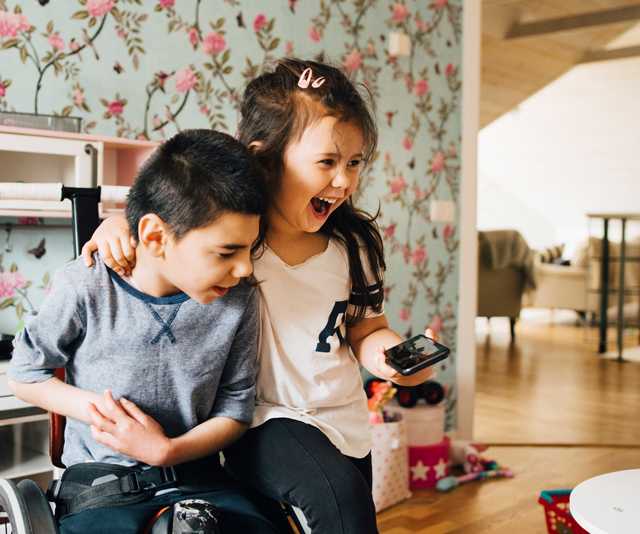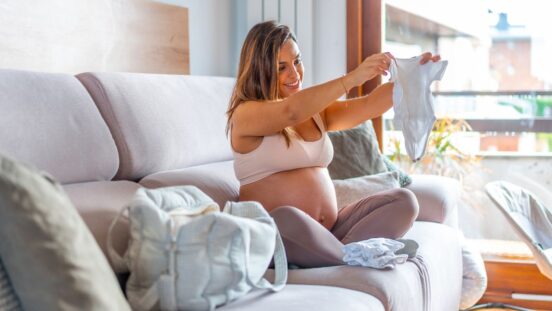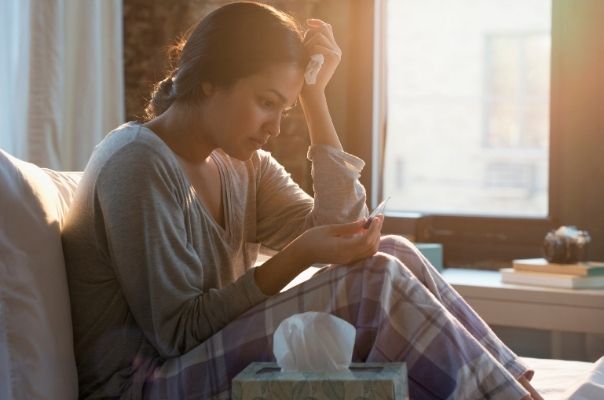Coronavirus and pregnancy: Victoria Government clarifies rules around maternity visitors
There will no limit on how long partners can stay after birth.
On Thursday pregnant women everywhere had a stressful moment upon hearing that in locked-down state, Victoria new rules would mean that partners would only be able to remain with new mothers and babies for two hours post-birth as part of measures to stem the spread of COVID-19.
Unsure of whether these rules would be extended to other states, new mums everywhere imagined an upsetting post-birth experience vastly different to what they had planned, as they would be alone only hours after being moved into postnatal units.
This morning Victorian health Minister, Jenny Mikakos has clarified yesterday’s announcement, and revealed that the government has changed its advice to expectant mothers so that there will be no limit on how long partners can remain with new mothers in the hours after they give birth.
This is vastly different to the announcement that had families upset on Thursday.
“From today, the rules that apply to maternity situations is that the woman is able to have her partner or support person for as long as is required for the entire labour and birth of their newborn baby and then their partner or support person is able to be with them for a two-hour visit after the baby is born,” Health Minister Jenny Mikakos said at a press conference on Thursday.
“This addresses some of the concerns we have seen in relation to at least one health service that I’m aware of in the last week. We have tried to strike the balance there between compassion and safety.”
Mum-to-be Survivor star, Moana Hope who is expecting her first child with pregnant wife Isabella Carlstrom, was one of the many people who voiced their upset at Thursday’s announcement.
“Can somebody PLEASE explain me why this has been put in place?’ Moana asked on Instagram.
“This doesn’t make sense. Kicking the partner out after two hours of birth… The mother needs help, the parent [or] support person needs to be there for those moments of birth.
“What if something happens to Mum or the baby, how dare this be a rule. Those first few days are some of the most important. Why would you take that away? Please educate me on this outrageous decision.”

Mums-to-be, Moana Hope and Isabella Carlstrom were distressed at Thursday’s announcement.
However, late on Thursday night, Minister Mikakos changed the narrative by declaring that partners can stay as long as required on the day of the birth, but visits on the days after the birth will be capped at two hours.
“The only thing that’s changed is a pregnant woman giving birth can now have one visitor when before it was two,” she wrote on Twitter just before 11pm on Thursday.
“Her partner/support person can stay for as long as they wish during labour and birth and after the baby is born.”
This change in direction is pleasing news for Dr Vijay Roach, Royal Australian and New Zealand College of Obstetricians president who spoke with ABC Radio National on Friday.
“We were concerned and had interpreted the advice as after a woman had given birth that her partner might need to leave the hospital within two hours after the birth,” he said.
“When we are talking about pregnancy and pregnant woman they have particular needs, there is increased anxiety and it’s a really important bonding time when someone gives birth, so we felt it was important to emphasise after the birth their partner was able to stay with them for as long as appropriate.”
Pregnant podcaster Monique Bowley took to her Instagram stories on Thursday to articulate just how upsetting it was to hear the news that she may be alone after her birth.
“Just when I thought this lockdown/COVID/vomitous pregnancy couldn’t get any more blissful or easy,” she captioned an image of her standing in her home, before sharing an image of a report announcing the early news of the partner limit.

Before Friday’s clarification, the news was extremely distressing for expectant mums, like Podcaster Monique Bowley.
Monique went on to share images of her previous birth experience, writing: “Last time I cried for five days straight. It was so brutally and hugely overwhelming.”
“And Nik was my shining light, doing ice runs for my fanny and helping me shower and staring at the baby for hours with me holding our breath. Letting me cry. Bathing our baby.And loving him with me. Wholly.”
She went on to express her empathy for those “doing this for the first time,” declaring that those first hours and days were “some of the most special days of our life.”
Dr Roach, while acknowledging that Thursday’s events were distressing, went on to praise the quick turnaround on the policy: “It’s just changed in 12 hours so I think that’s a really positive thing.
“Kudos to the government to responding to the concern and it’s possible it was a misinterpretation. These things are sometimes very difficult to understand.”

Partners can stay as long as required on the day of the birth, but visits on the days after the birth will be capped at two hours.
The United States was one of the first countries to implement similar safety precautions to labour wards, and all in the name of stopping the spread pop COVID-19 to the vulnerable, including new mums and their babies.
Dr Iffath Hoskins, an Obstetrician at NYU Langone Medical Center in New York, says, “Pregnant women are in a high-risk category because their immune system is lower and there are two patents: the mother and the fetus.”
She urged pregnant women to wash their hands often, not touch their face and practice social distancing when going for prenatal visits, ultrasound and lab testing. Also, try to book medical appointments at less busy times and sit at least six feet away from others in the waiting room.
The World Health Organization’s new guidelines state: There is no evidence pregnant women present with different signs or symptoms or are at a higher risk of severe illness. So far, there is no evidence on mother-to-child transmission when infection manifests in the third trimester. WHO recommends that caesarean section should ideally be undertaken only when medically justified.
WATCH: women share their childbirth experiences. Continues after video …
Advice for pregnant women amid COVID-19
Professor Mark Umstad, Director of Maternity Services at the Royal Women’s Hospital, is giving the following advice to pregnant women at this time.
“While there is limited information on the novel coronavirus currently, we do know that pregnant women especially should be vigilant when it comes to reducing the risk of infections,” said Professor Mark Umstad.
“When a woman is pregnant, her immune system changes, making her more susceptible to respiratory infections – which is why it is also important to vaccinate against whooping cough and influenza.”
“Although very little is known about the effects of this coronavirus, a small study of nine pregnant women with confirmed COVID-19 in Wuhan, China, found no evidence that the virus leads to severe adverse outcomes for newborn infants, or that it can be passed to the child while in the womb.
“Among the women, who were all late in their pregnancies giving birth by caesarean section, were two cases of fetal distress but all nine babies were delivered alive and tested negative to COVID-19. But we must remember this study is very small and done over a very short period of time.”




